- Home
- Helen Forrester
Mourning Doves Page 7
Mourning Doves Read online
Page 7
Louise was already on her way to the bathroom and in the distance they could hear Dorothy running across the hall to answer the front door. Over her shoulder, Louise agreed resignedly, and then said in a more normal voice, ‘Really, Phyllis should not be walking out in her condition.’
‘Times have changed, Mother. Ladies-in-waiting go about a lot more than they used to do.’
‘A true gentlewoman would not!’ The remark sounded so much more like her mother’s usual disapproval of Phyllis that Celia was quite relieved. Louise had disapproved of Phyllis ever since she had first appeared at the front door, when she was nine years old, to ask if Celia could come out to play hopscotch. In Louise’s opinion, the daughter of a carriage builder – a tradesman – was no companion for the granddaughter of a baronet and daughter of a prominent businessman in commerce. The girls had, however, clung to each other. Both were lonely and shy, great bookworms, and were over-protected – Phyllis because she was a precious only child and Celia because she was to be kept at home as a companion-help. Neither was allowed to mix very much with other children.
Celia let her mother cross the passage to the bathroom, and then ran lightly down the stairs, to be enveloped – as far as was possible – in her friend’s arms.
Chapter Eight
With a toddler clinging to her hand, Phyllis greeted her friend tenderly. ‘I’m so sad for you and for Mrs Gilmore. It must be terrible for you.’
‘Thank you, dear. How are you?’
The inquiry did not need a reply. Phyllis was her usual untidy self. Her hair below her wide-brimmed beige hat was threatening to fall down her back at any minute, and her face was drained of colour, except for black rings round her tired eyes. Her long black skirt, which had dog hairs on it, half-covered her swollen ankles. To disguise her pregnancy, she wore an out-of-fashion cheviot cape of her mother’s which barely met across her swollen stomach.
Phyllis simply grimaced in response to Celia’s mechanical inquiry, and then shrugged as if to convey that her well-being was of no consequence.
Celia went down on her knees to ask the toddler, ‘And how’s little Eric today?’
Eric turned away from her and buried his grubby, marmalade-smeared face in his mother’s skirt. Celia smiled and patted his flaxen head as she got up again.
‘Come into the breakfast room. There’s a good fire there. Dorothy hasn’t done the sitting room yet.’
Phyllis sighed with relief as she sank into Louise’s favourite chair. It was upholstered in faded green velveteen and was armless, which allowed space for the stout or pregnant to spread their skirts comfortably around them. She remarked with feeling, ‘I shall be thankful when my little burden arrives.’
‘It can’t be long now, can it?’ Celia asked. Though Phyllis had explained to her how dreadfully vulgar were the things a husband did to you which led to having a baby, Celia had never liked to inquire how long it took the baby to grow.
‘Any time now, the midwife thinks. This morning she advised that I should stay close to home.’ She shifted uneasily in her chair, and then went on, ‘You always get hours of warning, though, so I thought I should squeeze in a visit to you. You and Mrs Gilmore must be absolutely devastated.’
Celia nodded. She did not know how to explain what she was feeling, because after her little talk with Winnie in the basement kitchen she had sensed in herself a stirring of relief.
She had realised suddenly that she was not grieving for her father so much as she was upset at her own lack of competence in dealing with the disarray he had left behind him. He had been very hard to live with; and she had to admit that she had not, in the past week, missed his hectoring voice criticising some alleged fault in her behaviour.
To cover her confusion at Phyllis’s remark, she glanced round to check on little Eric.
She saw that he had discovered one of the household cats asleep on what had been Timothy Gilmore’s chair. He was nuzzling into the animal’s long black fur. It seemed to be tolerating him quite well, so she asked Phyllis if she was comfortable in the chair in which she was sitting. Having been assured ruefully that she was – as far as it was possible to be comfortable in her situation – Celia asked, ‘How many babies do you want to have, Phyllis?’
Phyllis laughed. She said cynically. ‘I don’t have any say in the matter. They simply come.’
‘Does it hurt?’
‘Yes – and it makes you so tired afterwards and you want to cry a lot. And husbands don’t like that, of course.’ Phyllis winced under her breath and straightened her back.
Celia drew a stool towards the fire, so that she could sit close to her friend. ‘Perhaps, when Mr Woodcock progresses in his career, you will be able to have a nanny as well as your maid?’ she suggested. She leaned forward to tug at the bell pull hanging beside the fireplace, to call Dorothy and ask her to bring some coffee.
Phyllis slowly drew off her black gloves, as she replied, ‘I hope so.’
Long ago, she had, when Celia had asked her, told her frankly the basic facts of sexual intercourse and that it was a right of a man to demand it of his wife. Poor Phyllis had gone into her marriage totally ignorant of what it implied, and had been so shocked and her husband so clumsy that she had never enjoyed it. She endured it as best she could – and the babies came, and her husband grew ever more irritable and hard to live with. Neither she nor Celia, therefore, had any idea that intercourse could be pleasurable. It was popular to coo over babies and forget what went beforehand.
Celia did not know the details of Phyllis’s marriage, but she did understand that her friend was worn out and unhappy, and she had long since begun to think that marriage was not quite the happy state that girls were told it was.
If one had an income of one’s own, she had considered, it would be pleasanter to remain single – except that one could not have a baby, and she herself would love to have just one, like little Eric.
Phyllis returned to the reason for her visit. ‘How is Mrs Gilmore?’ she asked.
‘She seems more herself this morning, a little less exhausted.’
‘I was horrified to see the For Sale notice on your gate. Does Mrs Gilmore really want to move?’
Even to Phyllis, Celia did not feel able to talk of financial problems; it was not the thing. So she said abruptly that the house was far too big and that they were going to renovate a summer cottage that they owned, in Meols. ‘The sea air, you know – Mother thinks it will be good for both of us. My Aunt Felicity left the place to Mother. Father didn’t like it, so it has been let for a number of years. It’s vacant now.’
Phyllis’s dejected expression lifted a little. ‘How lovely to be able to live by the sea,’ she responded longingly.
‘You’ll have to bring the family to visit us, once we’re settled in,’ Celia replied with a sudden glint of enthusiasm. ‘Sea air would do you a world of good.’ She suddenly saw an advantage to living in Meols. She could really give some relief to Phyllis by inviting her out for the day, with the children.
A sullen Dorothy arrived in response to the bell, and Celia told her to bring a pot of coffee and some biscuits and a glass of milk for Eric.
Celia’s ring had interrupted an anxious conning by Winnie and Dorothy of the Situations Vacant column in The Lady, a magazine devoted to the interests of middle-class families, which included a constant search for competent, cheap domestics.
Back in the kitchen, while she assembled the tray, Winnie glumly closed the magazine. ‘All the best jobs is in the south. Nothin’ up in the north here at all. We’d better look in the evening paper when it comes.’
‘Oh, aye,’ Dorothy agreed, as she quickly measured coffee beans into the grinder and turned the handle vigorously. ‘I were thinking I might try for a waitress’s job. You get tips then.’
‘That’s all right if you’ve got a home to go to. If you haven’t, you’ve got to find a room somewhere – and that’ll cost you.’
‘I suppose.’ Dorothy whisked the g
round coffee into a pot and poured boiling water over it from the kettle kept simmering on the hob. She stirred the coffee and clapped the lid on the pot. Then, as she paused to let the grounds settle, she asked, ‘Do you know where the Missus is? I want to do her bedroom.’
‘Lying in her nice warm bath, I’ll be bound – and no hot water left for washing the tiles in the hall. You take the tray up, and I’ll put the big kettle on the fire again.’
‘Ta ever so.’
As Dorothy moved a small side table closer to Celia and then set the tray down on it, she took a quick look at Phyllis’s face. Very close to her time, she reckoned knowingly, and this was confirmed by Phyllis’s face suddenly puckering up as the ache in her back became sharper.
If I were her, Dorothy thought, I wouldn’t be sitting here drinking coffee; I’d be on my way home, I would. It was not her business, however, so she withdrew discreetly, to descend again to the kitchen and share her thoughts with Winnie.
Chapter Nine
As Ethel clumped through the hall on her way to the kitchen to get a bucket of clean hot water with which to wash the tiles of the front hall, she heard a high shriek from the breakfast room, followed by the sound of someone bursting into tears. She paused uncertainly, wondering if the Missus and Miss Celia were having a row. Then she remembered that Mrs Woodcock had come on a visit while she had been wiping down the front railings and she wondered if the lady had, perhaps, fallen over the Old Fella’s footstool – and her expecting.
She put down her bucket, wiped her hands on her sackcloth apron and ran across to the breakfast-room door. Clearly through it, she heard Miss Celia’s agitated voice say, ‘You mean it’s coming?’
Mrs Woodcock replied tearfully, ‘Yes, dear. The water’s broken. Could you ask Mrs Gilmore to come – quickly? Please!’
In response to this urgent request, the bell in the kitchen jangled distantly. Ethel tentatively opened the door, to peep round it.
Mrs Woodcock was writhing and whimpering in the Mistress’s chair. She was gasping, ‘I’m so sorry, Celia. I’m so sorry.’
In order to remove her visitor’s wide-brimmed hat, Miss Celia was trying to take out Mrs Woodcock’s hatpins, which were pulling at the poor lady’s hair as she turned and twisted.
Thumb in mouth, Eric was staring at his mother. Then he let out a frightened yell and ran to her, to clutch at her skirt and try to climb on to her knee.
Dorothy came running through the green baize door at the back of the hall. She inquired of Ethel in a low voice, ‘What’s up?’ She crowded close to the little kitchen maid, her nose twitching nervously as she peered at the breakfast-room door.
Ethel stepped back from the door and turned to her eagerly. ‘I think Mrs Woodcock’s baby’s coming,’ she replied in an excited whisper. ‘Shall I run up and tell the Mistress?’
Dorothy paused for a moment, her hand on the brass doorknob.
‘Holy Mary! Are you sure?’
‘Sounds like it.’ Ethel pointed a thumb at the half-open door. They could both hear Phyllis’s frightened little gasps and Miss Celia’s ineffectual reassurances.
‘Oh, aye. Go and tell the Mistress – quick.’ Dorothy pushed the girl aside and, feeling a little scared, entered the room. She nearly tripped over a cat which shot out and across the hall.
Celia was bent over her friend. She looked up and exclaimed through white lips, ‘Oh, Dorothy! Thank goodness you’re here. Ask the Mistress to come down. Mrs Woodcock is in great distress.’
Eric, pushed away by his mother, was sitting on the hearth rug. At the sight of another strange woman, he began to shriek in good earnest.
Over his noisy protest, Dorothy replied calmly, ‘Ethel’s gone for her, Miss. Here, let me take the little boy.’ She bent down and swept the child up into her arms. ‘’Ere, now. You just be quiet – and your mam’ll be fine.’ She spun round and picked up a Marie biscuit from the coffee tray, then walked him over to the window. She pointed out a couple of pigeons roosting on the back wall and gave him the biscuit to eat. In thirty seconds, she had reduced his howls to small sobs.
She wiped away his tears with her apron and told him he was a good, brave little boy, and, in a minute or two, his Auntie Dorothy would take him down to see the tom cat in the kitchen.
Over her struggling friend’s head, Celia looked at Dorothy with amazement; she had never seen her before as anything but an automaton who cleaned rooms and waited at table, and said dully and mechanically, ‘Yes, Miss,’ or ‘No, Miss,’ in response to whatever was said to her.
Wrapped in a camelhair dressing gown, knitted slippers on her feet, Louise came running into the room, twisting her wet hair into a knot as she came. ‘That fool of a girl said …’ Then, as she saw the little tableau by the fireplace, she realised that the message Ethel had blurted out was true.
She had been feeling helpless and deserted as she lay crying in the cooling water of her bath. But when Ethel had knocked frantically at the bathroom door and poured out her message, she had instinctively responded to the call for help.
Now, faced with Phyllis’s obvious desperate need and the necessity of saving her fine old Turkish hearth rug from being ruined by having a baby born on it, she entirely forgot her grief.
She said calmly to Celia, ‘Find Ethel and send her for Dr Hollis.’
Celia fled.
Phyllis lifted a woebegone face, flushed with shame, to Louise. ‘I’m so sorry – oh – I’ve ruined your chair – the water’s broken.’ She gave another little moan. ‘I’m having a midwife, Mrs Fox from Green Lane – if I could get home, I could send for her.’
There was a tartness in Louise’s voice, as she responded, ‘I don’t have a carriage to send you home in, my dear. Timothy would never have a carriage – said they were more nuisance than help.’ As she spoke, she was pulling back the stool on which Celia had been seated, to clear a path to the door, so that they could move Phyllis upstairs.
‘To order a cab would take precious time,’ she went on. ‘I don’t think we should chance it. But don’t worry.’
The tearing, familiar ache which enclasped Phyllis’s waist eased for the moment and she protested quite coherently, ‘The pains don’t seem to be coming very fast yet. Surely I could reach home all right, couldn’t I?’
For reasons which Louise could not analyse herself, she was reluctant to let Phyllis go.
The sudden crisis had jolted her out of her own grief, diverted her mind. She was loath to face again a long day which, she knew, would otherwise become filled with problems which she did not know how to deal with. Childbirth was familiar – at least she knew from experience how to deal with that, she told herself.
With a sense of power and new-found energy, she said gently, ‘Don’t chance it, Phyllis. The baby might be damaged, if you gave birth in a cab. We’ll try to get you upstairs and on to a bed.’
With all her normal authority, she turned to Dorothy, who was jigging round and round to make the child in her arms laugh and was having some success with him. ‘Take the little boy down to the kitchen – Eric, is it? And ask Winnie to come up, please.’
Making a great game of Eric riding a horse, Dorothy galloped out of the room. Before Louise turned back to her stricken guest, she actually smiled briefly at such an amusing display from her parlourmaid.
Celia had already found Ethel in the kitchen, placidly emptying more hot water from the kettle into her bucket. She hastily instructed the young girl to take off her apron and run – run – for Dr Hollis. Then, a little breathlessly, she explained to a startled Winnie what was happening.
‘Well, I never!’ Winnie exclaimed with interest. She wiped her hands on the towel tucked into her waistband, and then stood with arms akimbo, as she considered the situation. ‘Do you think it’ll be born here?’
‘I don’t know, Winnie – I don’t know much about these things. Mrs Woodcock seems in great pain.’
‘Well, of course, you don’t know, Miss Celia. You being a single l
ady, like. I’ll put the kettle on in case.’ She seized her largest kettle and went to the sink to fill it.
‘Mrs Woodcock is all wet, Winnie – and the hearth rug and the chair are soaked.’
‘Oh, dear.’ The cook looked knowingly at her young mistress, as she hung the kettle on a hook over the roaring fire. She was about to say something more, when Dorothy clattered down the stairs, with a giggling Eric bumping on her shoulder.
‘Missus wants you – now. There’s a right to-do up there.’ She jerked her head towards the staircase. ‘And this young man wants to see Tommy Atkins, don’t you, pet?’
Tommy Atkins, long, thin and black, was curled up on Winnie’s rocking chair. At the sound of his name, he pricked up one ear and half opened a green eye, perhaps suspicious that he was about to be dumped in the cellars to deal with a mouse.
Winnie was already taking off her blue and white striped kitchen apron, to reveal a spotlessly white one underneath. She looked a little grim, as she said, ‘Oh, aye. Miss Celia just told me.’
Feeling that Eric was better left with Dorothy, who had obviously captivated him, she said to Celia, ‘If you don’t mind, Miss, you’d better come up as well. If we got to move Mrs Woodcock, like …’ She stumped up the stairs and Celia followed her, her thin white hands folded tightly against her stomach, as she tried to quell the panic within her. She dreaded to think what might be happening to Phyllis – and yet the situation held a morbid fascination for her. Could a baby really arrive like Phyllis had told her they did?
When they hurried into the breakfast room, Phyllis was still sitting in the ruined chair. To Celia’s relief, she did not appear to be in pain.
Louise was patting the pregnant woman’s shoulder comfortingly, as she said briskly to Winnie, ‘Celia will have told you of Mrs Woodcock’s condition. Do you have an old oilcloth tablecloth downstairs?’
To Celia’s surprise, Winnie did not seem particularly mystified by the question. ‘Er … Yes, Ma’am. There’s one on the table I keep the bread bin on. I could wipe it down for you.’

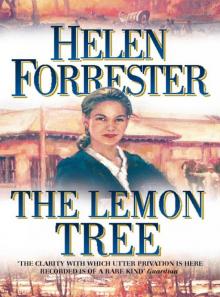 The Lemon Tree
The Lemon Tree Thursday's Child
Thursday's Child Yes, Mama
Yes, Mama Madame Barbara
Madame Barbara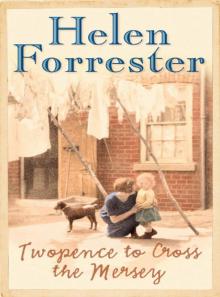 Twopence to Cross the Mersey
Twopence to Cross the Mersey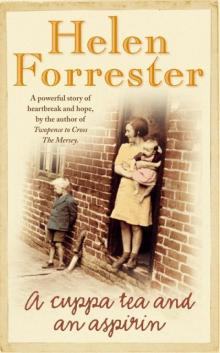 A Cuppa Tea and an Aspirin
A Cuppa Tea and an Aspirin The Moneylenders of Shahpur
The Moneylenders of Shahpur Lime Street at Two
Lime Street at Two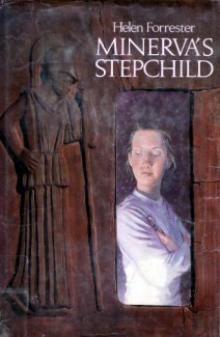 Minerva's Stepchild
Minerva's Stepchild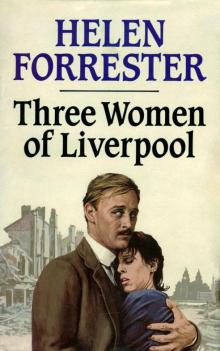 Three Women of Liverpool
Three Women of Liverpool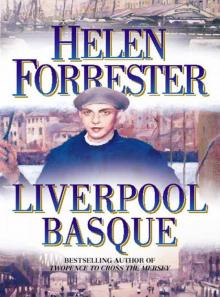 The Liverpool Basque
The Liverpool Basque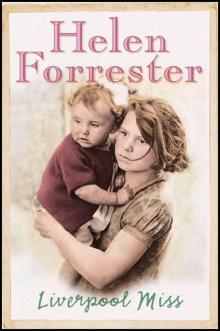 Liverpool Miss
Liverpool Miss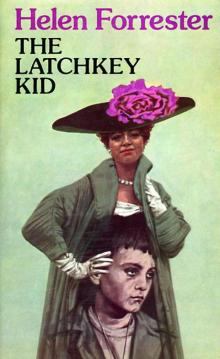 The Latchkey Kid
The Latchkey Kid Liverpool Daisy
Liverpool Daisy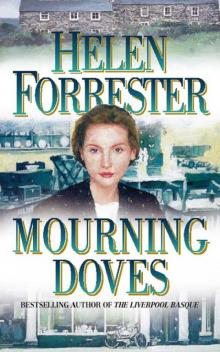 Mourning Doves
Mourning Doves